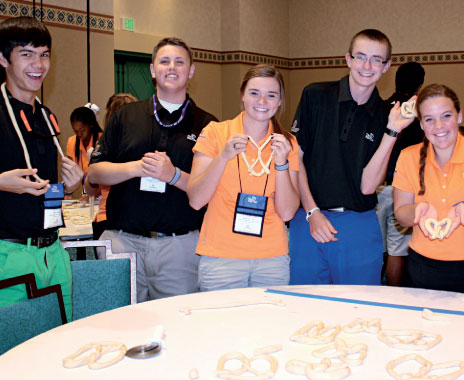Forget the age-old stereotype of teens being more interested in schlep than success. Auntie Anne’s corporate executives and franchise partners have seen first-hand that there is promising business potential in today’s high-school students.
Fifty teens at the brand’s Leaders & Entrepreneurs Forum held in early November at Disney World embraced a hands-on, learning-rich experience, digging deep to understand concrete concepts such as labor laws, OSHA standards, and whether franchises can be purchased by store or territories.
“Thinking back to when I was that age, I’m not sure I would have been that engaged in the business of a business conference if it was based at Walt Disney World,” says Heather Neary, chief marketing officer for the soft pretzel concept.
Auntie Anne’s partnered with The First Tee, an international youth development organization that introduces golf and its values to young people, to host the event. That a restaurant and a golf-based organization found each other and fostered an interesting and engaging entrepreneurial curriculum for high-school students made symbiotic sense, says Ryan Graff, The First Tee’s senior director of curriculum and research.
“Our organization focuses on life skills experiences. We teach four skill sets: interpersonal, self management, goal setting, and resiliency,” he says. “We partnered with Auntie Anne’s because we discovered a good number of our values are exactly the same. The matching value base made it a natural fit.”
Neary says Auntie Anne’s has a long philanthropic history and was founded on the value of giving back to the community. The brand’s president and chief operating officer, William Dunn, looks for “opportunities to help young people learn to dream and experience,” she says. Dunn made an initial connection with The First Tee, and the two organizations realized how well their cultures and vision aligned.
This was the first time The First Tee focused on entrepreneurial education, and organizers saw potential in introducing Auntie Anne’s business model as a basis for the curriculum.
“In high school, students focus on taking traditional math, science, and literature,” Graff says. “There is very little on financial education and being a business owner. It seemed a good idea to have a place to explore this further and discover what it means.”
Amy Rosen, president and CEO of Network for Teaching Entrepreneurship, an organization that inspires young people from low-income communities to recognize future business opportunities, says such entrepreneurial education empowers teens to foster attitudes, habits, and skills needed to face the new global economy. Youth can learn to be economically competitive, she says.
“Furthering these concepts is vital to the worldwide economic recovery and long-term prosperity,” Rosen adds. “The more we can provide entrepreneurship education, the sooner our current young people will become our job creators in a sustainable global economy.”
The Auntie Anne’s curriculum covered three spectrums: overall broad leadership, what it means to be an entrepreneur, and being a franchisee. In each component, students moved from a macro to a micro view, posing detailed questions from how much it costs to hire an architect and an attorney to placing equipment orders and negotiating space with landlords. With three of Auntie Anne’s franchise partners serving as instructors, students had access to real examples.
Brittany Woo, 17, says the forum was “an event of a lifetime because you learned what you needed to know and met people from all across the nation.” To get there, she and 130 other students submitted applications similar to scholarship applications. Essay questions asked students to describe how they planned to bring the information back to their communities.
Since returning to her high school, where she is a senior, Woo has put partnership skills to task by connecting several clubs to throw a school-wide field day for incoming freshmen, something she wouldn’t have done before the forum.
“It’s all about taking risks,” she says. “Most people are scared they are going to get a ‘no’ when it’s really all about perseverance.”
While Auntie Anne’s made the decision to sponsor the forum to keep in line with its core value of impacting young people, the company’s participation was not without perks and perhaps even strategy. As Woo says, “I’ve always known them for their pretzels, but now I know there is so much more.”
“The thing is, these 50 participants are going to be singing the praises of Auntie Anne’s when they go back home,” Graff says. “I can imagine a few might go on to become owners. The forum created champions for Auntie Anne’s.”
Graff says Auntie Anne’s smartly and proactively harnessed the power of teens and social media, encouraging the participants to tweet, use hashtags, and create traffic during the event. Prizes like sweatshirts were given to participants for the best tweets.
Auntie Anne’s Neary says she thinks the amount of time and capital put into the forum was well worth it. When sessions ran over into free time and kids were eager to continue asking questions, she knew they’d hit on something valuable and inspiring, from the perspectives of both the students and the teachers.
“These kids were exceptionally articulate and inquisitive,” she says. “It was great to see our future as an organization and world.”










